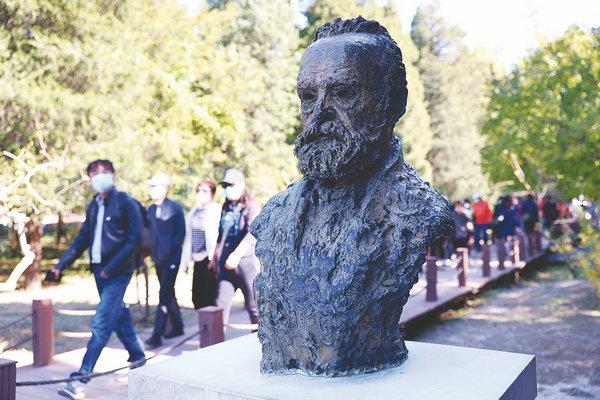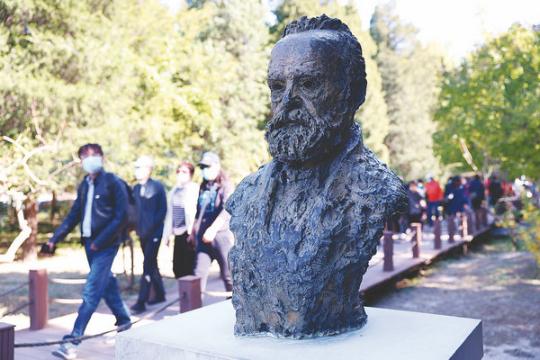More global visitors getting historical insight thanks to palace ruins

A sculpture of French writer Victor Hugo at Beijing's Old Summer Palace, also called Yuanmingyuan. (Photo provided to China Daily)
When Frenchman Remi Launay, 29, visited Beijing's Yuanmingyuan, or Old Summer Palace, in summer, the lines of a letter by famous French poet and novelist Victor Hugo engraved on the stone provoked his emotions.
"It was a kind of tremendous unknown masterpiece, glimpsed from the distance in a kind of twilight, like a silhouette of the civilization of Asia on the horizon of the civilization of Europe. ... One day two bandits entered the Summer Palace. One plundered, the other burned," the 19th century writer had penned.
As Launay, from Le Mans, somberly looked around the site, he kept asking his Chinese friend, Qin Tong, also 29, why the French army had committed its acts against the palace of the Qing Dynasty (1644-1911) emperors — invading Anglo-French forces had set the royal resort on fire and looted it in 1860.
It was a tragedy, that such a magnificent complex was destroyed, Launay says.
When the duo subsequently shared their emotional reaction to the Yuanmingyuan visit on popular Chinese social media platform Xiaohongshu, the move became an online hit, reflecting a growing interest in the site and Chinese history among local residents and foreigners alike.
Launay himself went to Yuanmingyuan amid an increasing ease of travel to China, following measures related to visa-free entry to the country for French visitors rolled out in late 2023.
Yuanmingyuan was also chosen because of convenient transportation to access it, Qin says.
Commenting on the two friends' post online, Beijing resident Chloe Wang shared her own story about visiting Yuanmingyuan with her husband Joseph, 38, an architectural designer from the United Kingdom with an interest in Chinese mortise-and-tenon joint building techniques.
Wang used an English audio guide to help Joseph learn about the history of Yuanmingyuan. He later expressed shock at how the British army could have burned Yuanmingyuan so completely.
He says that while he was aware of Britain's history of invading many countries worldwide, this was the first time he learned of this British aggression against China.
Both Qin and Wang were in turn surprised by their European partners' lack of awareness of the historical event. Qin observes that when it comes to Eastern culture, the French tend to focus more on Japan and South Korea, and in terms of colonial history, they place more emphasis on Africa.
Wang also mentions that she felt British history textbooks might not give this part of history the attention it deserves.
"In Western countries, historical narratives are often dominated by the perspective of the West, which has, to some extent, created a 'shielding effect' toward China," Zhang Yiwu, a professor from Peking University, said in an interview with Chinese media.
The image of China in the international sphere can be complex: On the one hand, the success story of China's rise as the world's second-largest economy is often celebrated, but on the other hand the voices of many Western politicians and media criticizing China always seem to find an audience.
One root cause of foreign misperceptions about China is an incomplete and inadequate understanding of the country, according to observers.
Qin and Launay say that seeing the ruins of Yuanmingyuan and its artifacts displayed under glass cases for site visitors to view fueled their yearning for peace and the need for better understanding across cultures.
To better tell the story of Yuanmingyuan to foreign audiences, they also suggest adding multilingual navigation services and using virtual reality technology.
This is to allow more people to learn about this "hidden history", so that they can better understand its far-reaching impact, according to Qin and Launay. "Cherish peace and appreciate culture — this is progress," Launay says.

